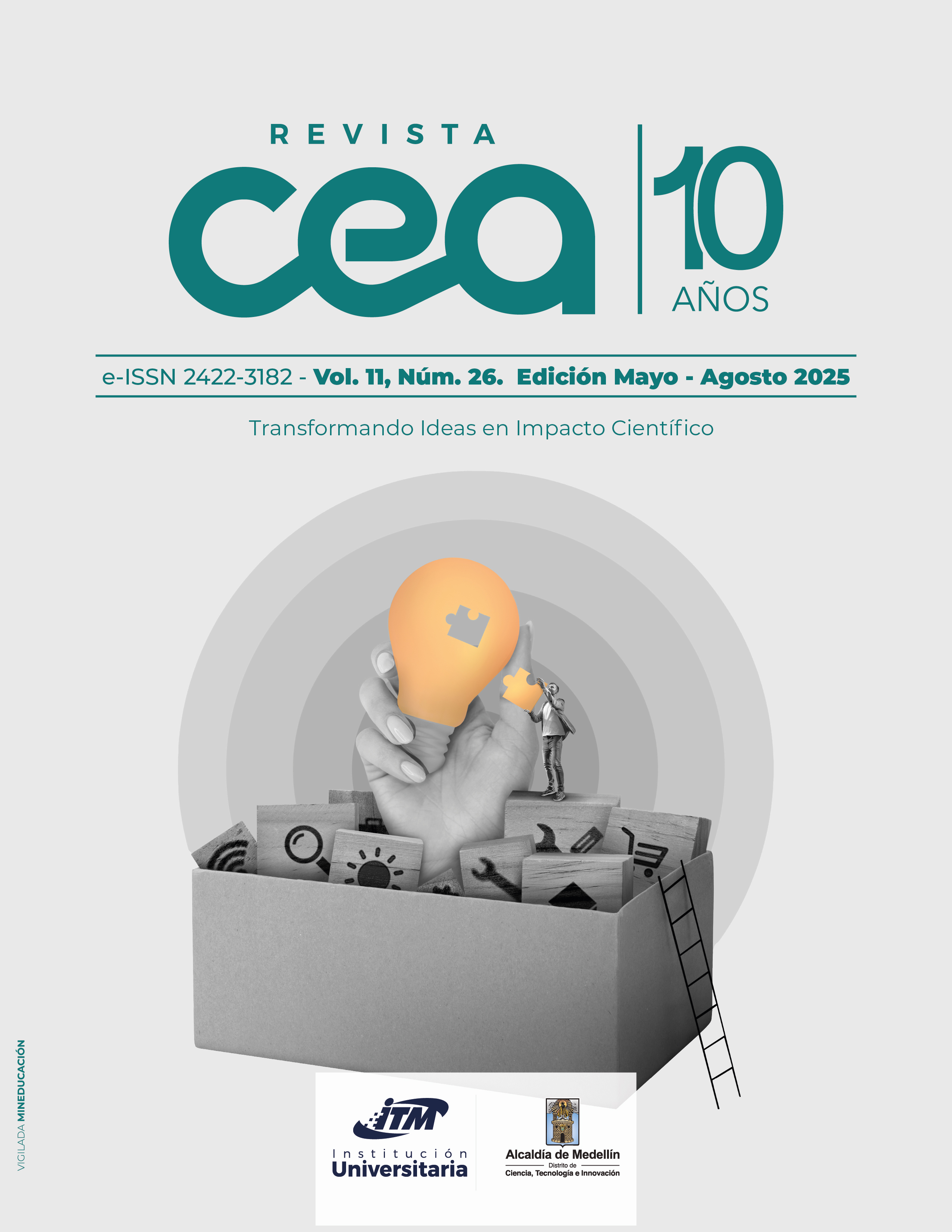Empresas B y desarrollo sostenible: tendencias globales a partir de un análisis bibliométrico (1991-2023)
Resumen
Objetivo: esta investigación analiza la evolución literaria presentada en torno de las empresas B y sus cinco dimensiones (gobierno, comunidad, trabajadores, medioambiente y clientes) relacionadas con la sostenibilidad empresarial, identificando patrones científicos y brechas en el conocimiento.
Diseño/metodología: se realizó una minería de datos científica de las bases de datos Scopus y Web of Science (WoS), utilizando tres herramientas informáticas especializadas: la interfaz del software R Biblioshiny, Vantage Point y VOSviewer. Se tomó como intervalo las últimas 4 décadas y se identificaron 98 artículos de revista de alto impacto.
Resultados: los países que lideran la investigación mundial en tópicos como responsabilidad social corporativa y sostenibilidad son China y Reino Unido. Los temas principales, de acuerdo con el análisis de coocurrencia de palabras claves, son el desarrollo sostenible, la sostenibilidad, y la responsabilidad social corporativa junto con el desempeño ambiental; la mayor relación presentada entre estas temáticas es en su respectivo orden con empresas B, desarrollo sostenible, sostenibilidad y responsabilidad social corporativa.
Conclusiones: las investigaciones actuales sobre empresas B han tratado de forma desarticulada las temáticas en torno al gobierno corporativo y su responsabilidad social, los diferentes grupos de interés con sus teorías, y la sostenibilidad con el desarrollo sostenible. Por tanto, futuras líneas de investigación se pueden realizar analizando la relación entre el gobierno corporativo y la responsabilidad social junto con los grupos de interés.
Originalidad: este trabajo realiza relevantes aportes sobre la dimensión de las organizaciones B y su relación con la sostenibilidad empresarial generando una agenda futura sobre futuras investigaciones.
Referencias bibliográficas
Abbas, J. (2020). Impact of total quality management on corporate green performance through the mediating role of corporate social responsibility. Journal of Cleaner Production, 242, 118458. https://doi.org/10.1016/j.jclepro.2019.118458
Acevedo-Duque, Á., Álvarez-Herranz, A. P., & Artigas, W. (2023). Contribución a la marca país a través de la sostenibilidad de los procesos productivos en Chile: Empresas B Corp. Retos, 13(26), 253–271. https://doi.org/10.17163/ret.n26.2023.05
Ada, N. (2022). Sustainable Supplier Selection in Agri-Food Supply Chain Management. International Journal of Mathematical, Engineering and Management Sciences, 7(1), 115–130. https://doi.org/10.33889/IJMEMS.2022.7.1.008
Ardito, L., Dangelico, R. M., & Messeni Petruzzelli, A. (2021). The link between female representation in the boards of directors and corporate social responsibility: Evidence from B corps. Corporate Social Responsibility and Environmental Management, 28(2), 704–720. https://doi.org/10.1002/csr.2082
Attanasio, G., Battistella, C., & Chizzolini, E. (2025). B‐Corp Certification: Systematic Literature Review and Research Agenda. Corporate Social Responsibility and Environmental Management, 23(3), 3729-3769. https://doi.org/10.1002/csr.3118
Bermeo-Giraldo, M. C., Mosquera González, D., Moreno López, G. A., & Rodríguez Zavala, L. (2023). Tendencias investigativas en el área de historia empresarial: una aproximación bibliométrica. Revista CEA, 9(20), e2454. https://doi.org/10.22430/24223182.2454
Boni, L., Chiodo, V., Gerli, F., & Toschi, L. (2024). Do prosocial‐certified companies walk the talk? An analysis of B Corps’ contributions to Sustainable Development Goals. Business Strategy and the Environment, 33(3), 2518–2532. https://doi.org/10.1002/bse.3612
Bringas-Fernández, V., López-Gutiérrez, C., & Pérez, A. (2024). B-CORP certification and financial performance: A panel data analysis. Heliyon, 10(17), e36915. https://doi.org/10.1016/j.heliyon.2024.e36915
Brundtland, G. H. (1987). Our common future—Call for action. Environmental Conservation, 14(4), 291–294. https://doi.org/10.1017/S0376892900016805
Brundtland, G. H., y Khalid, M. (1987). Our common future. Oxford University Press.
Carroll, A. B. (1991). The pyramid of corporate social responsibility: Toward the moral management of organizational stakeholders. Business Horizons, 34(4), 39–48. https://doi.org/10.1016/0007-6813(91)90005-G
Cantele, S., Leardini, C., & Piubello Orsini, L. (2023). Impactful B corps: A configurational approach of organizational factors leading to high sustainability performance. Corporate Social Responsibility and Environmental Management, 30(3), 1104-1120. https://doi.org/10.1002/csr.2407
Ceccoli, R. D., Bianchi, D. A., Zocchi, S. B., & Rial, D. V. (2024). Mapping the field of aroma ester biosynthesis: A review and bibliometric analysis. Process Biochemistry, 146, 587–600. https://doi.org/10.1016/j.procbio.2024.10.002
Chadegani, A. A., Salehi, H., Yunus, M. M., Farhadi, H., Fooladi, M., Farhadi, M., & Ebrahim, N. A. (2013). A comparison between two main academic literature collections: Web of Science and Scopus databases. Asian Social Science, 9(5). https://www.ccsenet.org/journal/index.php/ass/article/view/26960
Chavan, M., Gowan, S., & Vogeley, J. (2023). Collaborative corporate social responsibility praxis: case studies from India. Social Responsibility Journal, 19(2), 229–248. https://doi.org/10.1108/SRJ-06-2021-0216
Chen, W. D., & Marquis, C. (2022). Remaking capitalism: The movement for sustainable business and the future of the corporation. Management Decision, 60(11), 2897–2903. https://doi.org/10.1108/MD-08-2021-1086
Chistov, V., Aramburu, N., & Carrillo-Hermosilla, J. (2021). Open eco-innovation: A bibliometric review of emerging research. Journal of Cleaner Production, 311, 127627. https://doi.org/10.1016/j.jclepro.2021.127627
Clarkson, M. E. (1995). A stakeholder framework for analyzing and evaluating corporate social performance. Academy of Management Review, 20(1), 92–117. https://doi.org/10.2307/258888
Da Silva, M. A., Borchardt, M., Pereira, G. M., Cardoso, J., Milan, G. S., & Leite, R. L. (2023). Developing a Sustainable Business Model in the Bioeconomy: A Case Study of an Amazon Rainforest Enterprise. International Journal of Sustainable Development and Planning, 18(9), 2703–2712. https://doi.org/10.18280/ijsdp.180909
Diabat, A., & Govindan, K. (2011). An analysis of the drivers affecting the implementation of green supply chain management. Resources, Conservation and Recycling, 55(6), 659–667. https://doi.org/10.1016/j.resconrec.2010.12.002
Diabat, A., Kannan, D., & Mathiyazhagan, K. (2014). Analysis of enablers for implementation of sustainable supply chain management – A textile case. Journal of Cleaner Production, 83, 391–403. https://doi.org/10.1016/j.jclepro.2014.06.081
Diez-Busto, E., Sanchez-Ruiz, L., & Fernandez-Laviada, A. (2021). The B Corp Movement: A Systematic Literature Review. Sustainability, 13(5), 2508. https://doi.org/10.3390/su13052508
Dixon, S. E. A., & Clifford, A. (2007). Ecopreneurship – a new approach to managing the triple bottom line. Journal of Organizational Change Management, 20(3), 326–345. https://doi.org/10.1108/09534810710740164
Dyllick, T., & Hockerts, K. (2002). Beyond the business case for corporate sustainability. Business Strategy and the Environment, 11(2), 130–141. https://doi.org/10.1002/bse.323
Escudero, S. B., Jestratijevic, I., Short, J. C., & Wolfe, M. T. (2023). B Corp certification in the age of fast fashion: Using hierarchical clustering and correspondence factor analysis to highlight social entrepreneurial advancement in the fashion industry. Journal of Business Venturing Insights, 20, e00412. https://doi.org/10.1016/j.jbvi.2023.e00412
Fatimah, Y. A., Kannan, D., Govindan, K., & Hasibuan, Z. A. (2023). Circular economy e-business model portfolio development for e-business applications: Impacts on ESG and sustainability performance. Journal of Cleaner Production, 415, 137528. https://doi.org/10.1016/j.jclepro.2023.137528
Ferioli, M., Gazzola, P., Grechi, D., & Vătămănescu, E.-M. (2022). Sustainable behaviour of B Corps fashion companies during Covid-19: A quantitative economic analysis. Journal of Cleaner Production, 374, 134010. https://doi.org/10.1016/j.jclepro.2022.134010
Ficco, C., Bersía, P., Bressan, C., & Herrera-Rodríguez, E. E. (2023). Contribution of Argentinian B Corporations to Sustainable Development Goals: Empirical Analysis Based on Their Practices and Solutions to Socioenvironmental Problems. Sustainability, 16(1), 6. https://doi.org/10.3390/su16010006
Freeman, R. E. (2010). Strategic Management: A Stakeholder Approach. Cambridge University Press.
García-Villar, C., & García-Santos, J. M. (2021). Indicadores bibliométricos para evaluar la actividad científica. Radiología, 63(3), 228–235. https://doi.org/10.1016/j.rx.2021.01.002
Gazzola, P., Paterson, A., Amelio, S., & Ferioli, M. (2022). Certified B Corporations and Innovation: Crowdfunding as a Tool for Sustainability. Sustainability, 14(24), 16639. https://doi.org/10.3390/su142416639
Hariyani, D., & Mishra, S. (2023). An analysis of drivers for the adoption of integrated sustainable-green-lean-six sigma-agile manufacturing system (ISGLSAMS) in Indian manufacturing industries. Benchmarking An International Journal, 30(4), 1073–1109. https://doi.org/10.1108/BIJ-08-2021-0488
Hariyani, D., & Mishra, S. (2024). A descriptive statistical analysis of enablers for integrated sustainable-green-lean-six sigma-agile manufacturing system (ISGLSAMS) in Indian manufacturing industries. Benchmarking An International Journal, 31(3), 824-865. https://doi.org/10.1108/BIJ-06-2022-0344
Haunschild, R., & Bornmann, L. (2022). Reference publication year spectroscopy (RPYS) in practice: a software tutorial. Scientometrics, 127(12), 7253–7271. https://doi.org/10.1007/s11192-022-04369-8
Hart, S. L. (1995). A natural-resource-based view of the firm. Academy of Management Review, 20(4), 986–1014. https://doi.org/10.2307/258963
Hoyos, O., Castro Duque, M., Toro León, N., Trejos Salazar, D., Montoya-Restrepo, L. A., Montoya-Restrepo, I. A., & Duque, P. (2023). Gobierno corporativo y desarrollo sostenible: un análisis bibliométrico. Revista CEA, 9(19), e2190. https://doi.org/10.22430/24223182.2190
Jastrzębska, E. (2021). Ruch B Corp wobec wyzwań zrównoważonego rozwoju w dobie pandemii COVID-19 – wybrane polskie przykłady. Studia Ecologiae et Bioethicae, 19(2), 63–75. https://doi.org/10.21697/seb.2021.19.2.06
Johri, A., Joshi, P., Kumar, S., & Joshi, G. (2024). Metaverse for Sustainable Development in a bibliometric analysis and systematic literature review. Journal of Cleaner Production, 435, 140610. https://doi.org/10.1016/j.jclepro.2024.140610
Kannan, D. (2018). Role of multiple stakeholders and the critical success factor theory for the sustainable supplier selection process. International Journal of Production Economics, 195, 391–418. https://doi.org/10.1016/j.ijpe.2017.02.020
Kirst, R. W., Borchardt, M., De Carvalho, M. N. M., & Pereira, G. M. (2021). Best of the world or better for the world? A systematic literature review on benefit corporations and certified B corporations contribution to sustainable development. Corporate Social Responsibility and Environmental Management, 28(6), 1822–1839. https://doi.org/10.1002/csr.2160
Lähteenkorva, M., Tynjälä, P., & Kallio, E. K. (2025). From knowledge to wisdom in sustainable management education - Insights from a B Corp course. The International Journal of Management Education, 23(2), 101148. https://doi.org/10.1016/j.ijme.2025.101148
Le, T. T. (2022). Corporate social responsibility and SMEs’ performance: mediating role of corporate image, corporate reputation and customer loyalty. International Journal of Emerging Markets, 18(10), 4565-4590. https://doi.org/10.1108/IJOEM-07-2021-1164
Leopizzi, R., & Lippolis, S. (2024). How do companies show their contributions to the SDGs? The B-Corps’ experience. En A. Venturelli y C. Mio (eds.), The Routledge Handbook of Accounting for the Sustainable Development Goals (pp. 502–516). Routledge. https://doi.org/10.4324/9781003404118-33
Mahna, T., Jain, S., & Yadav, S. S. (2025). Determining future research trends in Sustainable Foreign Direct Investment: A bibliometric and content analysis. Research in International Business and Finance, 77(A), 102930. https://doi.org/10.1016/j.ribaf.2025.102930
Mandal, P. C. (2024). Balancing Corporate Social Responsibility and Corporate Profitability: A Marketing Perspective. En D. A. M. Roache (aut.), Ethical Quandaries in Business Practices: Exploring Morality and Social Responsibility (pp. 53-74). IGI Global. https://doi.org/10.4018/979-8-3693-3948-0.ch003
Mann, M., Byun, S.-E., & Ginder, W. (2021). B Corps’ Social Media Communications during the COVID-19 Pandemic: Through the Lens of the Triple Bottom Line. Sustainability, 13(17), 9634. https://doi.org/10.3390/su13179634
Metz, D., Ilieș, L., & Nistor, R. L. (2020). The Impact of Organizational Culture on Customer Service Effectiveness from a Sustainability Perspective. Sustainability, 12(15), 6240. https://doi.org/10.3390/su12156240
Michán, L., & Muñoz-Velasco, I. (2013). Scientometrics for the medical sciences: Definitions, applications and perspectives. Investigación en Educación Médica, 2(6), 100–106. https://doi.org/10.1016/S2007-5057(13)72694-2
Mion, G., Bonfanti, A., De Crescenzo, V., & Loza Adaui, C. R. (2024). Mission statement and social impact: Shedding light on the contribution of Italian B corps to society. Long Range Planning, 57(1), 102377. https://doi.org/10.1016/j.lrp.2023.102377
Montiel Vargas, A. (2023). B lab and the process of certificating B corps. In H. Peter, C. Vargas Vasserot & J. Alcalde Silva (eds), The International Handbook of Social Enterprise Law (pp. 281-299). Springer. https://doi.org/10.1007/978-3-031-14216-1_13
Moroz, P. W., & Gamble, E. N. (2021). Business model innovation as a window into adaptive tensions: Five paths on the B Corp journey. Journal of Business Research, 125, 672–683. https://doi.org/10.1016/j.jbusres.2020.01.046
Najaf, K., Haj Khalifa, A., Obaid, S. M., Rashidi, A. A., & Ataya, A. (2023). Does sustainability matter for Fintech firms? Evidence from United States firms. Competitiveness Review: An International Business Journal, 33(1), 161–180. https://doi.org/10.1108/CR-10-2021-0132
Nigri, G., Del Baldo, M., & Agulini, A. (2020). The Mondora Method: Quantum Leaders in Benefit Corporations. Entrepreneurship Research Journal, 10(4), 20190309. https://doi.org/10.1515/erj-2019-0309
Onbhuddha, R., & Ogata, S. (2024). The influence of stakeholder on a company’s sustainable practice: Insights from the Japanese perspective. Journal of Cleaner Production, 436, 140402. https://doi.org/10.1016/j.jclepro.2023.140402
Osterwalder, A., Pigneur, Y., & Tucci, C. L. (2005). Clarifying business models: Origins, present, and future of the concept. Communications of the Association for Information Systems, 16(1), 1. https://doi.org/10.17705/1CAIS.01601
Paelman, V., Van Cauwenberge, P., & Vander Bauwhede, H. (2021). The Impact of B Corp Certification on Growth. Sustainability, 13(13), 7191. https://doi.org/10.3390/su13137191
Palácios, H., De Almeida, H., & Sousa, M. J. (2021). A Bibliometric Analysis of Service Climate as a Sustainable Competitive Advantage in Hospitality. Sustainability, 13(21), 12214. https://doi.org/10.3390/su132112214
Platonova, E., Asutay, M., Dixon, R., & Mohammad, S. (2018). The impact of corporate social responsibility disclosure on financial performance: Evidence from the GCC Islamic banking sector. Journal of Business Ethics, 151, 451–471. https://doi.org/10.1007/s10551-016-3229-0
Pollmeier, T., Hirschmann, M., & Fisch, C. (2025). Exploring the signaling effect of B Corp certification in entrepreneurial finance. Journal of Cleaner Production, 493, 144978. https://doi.org/10.1016/j.jclepro.2025.144978
Poponi, S., Colantoni, A., Cividino, S. R. S., & Mosconi, E. (2019). The Stakeholders’ Perspective within the B Corp Certification for a Circular Approach. Sustainability, 11(6), 1584. https://doi.org/10.3390/su11061584
Primc, K., Dominko, M., & Slabe-Erker, R. (2021). 30 years of energy and fuel poverty research: A retrospective analysis and future trends. Journal of Cleaner Production, 301, 127003. https://doi.org/10.1016/j.jclepro.2021.127003
Putnam Rankin, C., & Matthews, T. L. (2020). Patterns of B Corps Certification: The Role of Institutional, Economic, and Political Resources. Societies, 10(3), 72. https://doi.org/10.3390/soc10030072
Ramos-Escobar, E. A., García-Pérez-de-Lema, D., Castillo-Vergara, M., & Valdez-Juárez, L. E. (2022). Immigrant entrepreneurs: A review of the literature and an agenda for future investigations. International Journal of Intercultural Relations, 91, 170–190. https://doi.org/10.1016/j.ijintrel.2022.09.009
Rapti, S., Tselegkaridis, S., Sapounidis, T., & Triantafyllou, S. A. (2025). A bibliometric and content analysis of educational robotics’ impact on communication, collaboration, critical thinking, and creativity in kindergarten. Thinking Skills and Creativity, 57, 101849. https://doi.org/10.1016/j.tsc.2025.101849
Rastogi, T., Agarwal, B., & Gopal, G. (2024). Exploring the nexus between sustainable marketing and customer loyalty with the mediating role of brand image. Journal of Cleaner Production, 440, 140808. https://doi.org/10.1016/j.jclepro.2024.140808
Sachdeva, S., Ramesh, L., Mathew, M., & K. S., M. (2023). Measurement of Corporate Social Responsibility of Financial Companies in the Indian Context. Indian Journal of Finance, 17(12), 56. https://doi.org/10.17010/ijf/2023/v17i12/172059
Shakeel, J., Mardani, A., Chofreh, A. G., Goni, F. A., & Klemeš, J. J. (2020). Anatomy of sustainable business model innovation. Journal of Cleaner Production, 261, 121201. https://doi.org/10.1016/j.jclepro.2020.121201
Silva, V., Lima, V., Sá, J. C., Fonseca, L., & Santos, G. (2022). B Impact Assessment as a Sustainable Tool: Analysis of the Certification Model. Sustainability, 14(9), 5590. https://doi.org/10.3390/su14095590
Stubbs, W. (2017). Characterising B Corps as a sustainable business model: An exploratory study of B Corps in Australia. Journal of Cleaner Production, 144, 299-312. http://dx.doi.org/10.1016/j.jclepro.2016.12.093
Tabares, S. (2021a). Certified B corporations: An approach to tensions of sustainable-driven hybrid business models in an emerging economy. Journal of Cleaner Production, 317, 128380. https://doi.org/10.1016/j.jclepro.2021.128380
Tabares, S. (2021b). Do hybrid organizations contribute to Sustainable Development Goals? Evidence from B Corps in Colombia. Journal of Cleaner Production, 280, 124615. https://doi.org/10.1016/j.jclepro.2020.124615
Tabares, S., Morales, A., Calvo, S., & Molina Moreno, V. (2021). Unpacking B Corps’ Impact on Sustainable Development: An Analysis from Structuration Theory. Sustainability, 13(23), 13408. https://doi.org/10.3390/su132313408
Thomas, A. E., Bhaumik, A., & Aruja, J. M. (2023). The Impact of Corporate Governance Practices on Firm-Level Innovations and their Market Value : Empirical Evidence from India. Indian Journal of Finance, 17(11), 26. https://doi.org/10.17010/ijf/2023/v17i11/170424
Turnbull, S. (1992). Re-Inventing Corporations. Human Systems Management, 10(3), 169–186. https://doi.org/10.3233/HSM-1991-10303
Vicente-Pascual, J. A., Paradinas Márquez, M. del C., & González-Rodrigo, E. (2024). Key elements for achieving high impact and their relationship to the SDGs: Analysis of BCorp-certified companies in the primary sector. Technological Forecasting and Social Change, 201, 123176. https://doi.org/10.1016/j.techfore.2023.123176
Xiang, G., He, Z., Feng, T., & Feng, Z. (2024). Is B Corp certification sufficiently attractive to emerging markets? A conceptual study of B Corps in China. International Journal of Emerging Markets. https://doi.org/10.1108/IJOEM-09-2022-1350
Xu, E. G., Graves, C., Shan, Y. G., & Yang, J. W. (2022). The mediating role of corporate social responsibility in corporate governance and firm performance. Journal of Cleaner Production, 375, 134165. https://doi.org/10.1016/j.jclepro.2022.134165
Yang, S.-S., Wu, W.-M., Pang, J.-W., He, L., Ding, M.-Q., Li, M.-X., Zhao, Y.-L., Sun, H.-J., Xing, D.-F., Ren, N.-Q., Yang, J., Criddle, C. S., & Ding, J. (2023). Bibliometric analysis of publications on biodegradation of plastics: Explosively emerging research over 70 years. Journal of Cleaner Production, 428, 139423. https://doi.org/10.1016/j.jclepro.2023.139423
Yassin, A. M. M., Hassan, M. A., & Elmesmary, H. M. (2022). Key elements of green supply chain management drivers and barriers empirical study of solar energy companies in South Egypt. International Journal of Energy Sector Management, 16(3), 564–584. https://doi.org/10.1108/IJESM-10-2020-0014
Zou, P. X. W., Zhang, G., & Wang, J. (2007). Understanding the key risks in construction projects in China. International Journal of Project Management, 25(6), 601–614. https://doi.org/10.1016/j.ijproman.2007.03.001
Descargas
Derechos de autor 2025 Alfredo Enrique Sanabria-Ospino, Diana Milena López García, Fabio Andrés Puerta-Guardo, William Stive Fajardo-Moreno, Ana Susana Cantillo-Orozco

Esta obra está bajo una licencia internacional Creative Commons Atribución-NoComercial-CompartirIgual 4.0.

| Estadísticas de artículo | |
|---|---|
| Vistas de resúmenes | |
| Vistas de PDF | |
| Descargas de PDF | |
| Vistas de HTML | |
| Otras vistas | |







